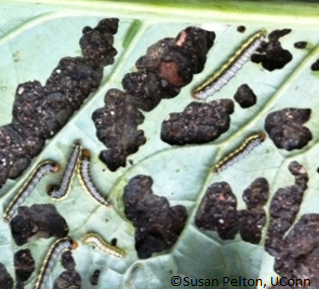Bacillus Thuringiensis
Bacillus thuringiensis, or Bt, is a widely-used microbial biological insect control. Bt is a bacterium that produces crystal proteins that poison, paralyze, and kill targeted pests after ingestion. Bt is found in soil all over the world in almost all types of terrain from desert to tundra. It was first discovered in 1901 by the Japanese biologist Shigetane Ishiwatari as he was investigating the death of large populations of silkworms. He named it Bacillus sotto although it was changed to Bacillus thuringiensis by Ernst Berliner in 1911, a German scientist who re-isolated it as the cause of death of the Mediterranean flour moth larvae. Farmers started using it in 1920 and there are currently more than 35 varieties of this naturally occurring, soil-borne bacterium.
Bt bacteria are one-celled organisms that reproduce asexually through spores creating crystal proteins as it does. These spores and crystals must be ingested by the immature feeding stage of development (larval) of insects to be effective. It is ineffective against mature insects and is not harmful to animals, birds, or humans. Once inside the digestive gut the crystals dissolve causing a paralysis that interrupts normal digestion and causes the larvae to stop feeding. Bt spores continue to multiply within the dying insect and will return to the soil as the insect decomposes.

Cross striped cabbage worm
Strains of Bt
Particular strains of Bt proteins are host-specific, binding to certain receptors in the insect's gut wall like a lock and key. It is important to use the strain of Bt that targets a certain pest. New to the home market in 2015 was the strain Bacillus thuringiensis galleriae (Btg) which is reportedly effective against both the adult and grub forms of Japanese, Asian, and Oriental beetles, all of which cause large amounts of damage to turf. The following are some of the most commonly used Bt strains:
| Strain | Order Affected | Uses |
| Bt aizawai | Lepidoptera: Moths, Butterflies |
Wax moth larvae in honeycombs, grape berry moth |
| Bt galleriae (Btg) | Coleoptera: Beetles |
Possibly both adult and larval stages of Asian, Japanese, and Oriental beetles |
| Bt israelensis (Bti) | Diptera: Flies, Mosquitos, Gnats |
Mosquito larvae, fungus gnat larvae, blackfly larvae |
| Bt japonensis and kumamotensis | Coleoptera: Beetles |
Northern masked chafer and oriental beetle larvae |
| Bt kurstaki (BtK) | Lepidoptera: Moths, Butterflies |
Cabbage loopers, codling moth larvae, cutworm, diamondback moth larvae, Gypsy moth caterpillars, hydrangea leaftier caterpillars, imported cabbageworm, sod webworm, spruce budworms, tomato hornworms |
| Bt var. san diego (BtSD) and tenebrionis | Coleoptera: Beetles |
Leaf-feeding beetle larvae, black vine weevil larvae, boll weevil larvae, Colorado potato beetle larvae, Elm leaf beetle larvae |
Application
It is important that the application of Bt coincides with the larval stage of the target insect. For instance, using BtK on Gypsy moth caterpillars will only be effective when the larvae are young and should be applied prior to June 1st. Also, temperature, sunlight, and rainfall will reduce the effectiveness. It is best applied on dry days early in the morning. Most Bt strains are available commercially as ready-to-use liquid, concentrates, or dusts. Repeat applications may be needed. Be sure to follow all label directions.
Despite good cultural practices, pests and diseases at times may appear. Chemical control should be used only after all other methods have failed. For pesticide information please call UConn Home and Garden Education Center or your local cooperative extension office.
The UConn Home & Garden Education Center supports UConn Extension’s mission by providing answers you can trust with research-based information and resources. For gardening questions, contact us toll-free at (877) 486-6271, visit our website at homegarden.cahnr.uconn.edu, or reach out to your local UConn Extension center at cahnr.uconn.edu/extension/locations.
UConn Home and Garden Education Center, 2019.